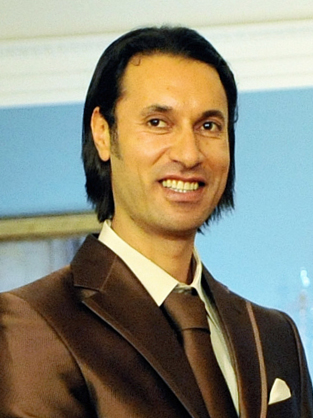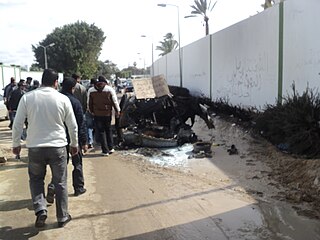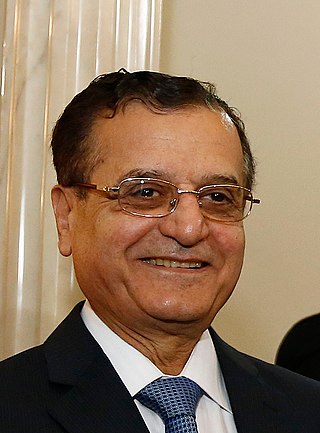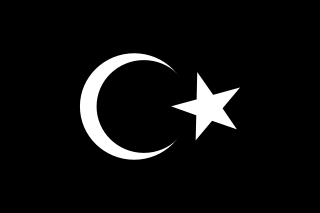Related Research Articles

The politics of Libya has been in an uncertain state since the collapse of the Libyan Arab Jamahiriya in 2011 and a recent civil war and various jihadists and tribal elements controlling parts of the country. On 10 March 2021, the interim Government of National Unity (GNU), unifying the Second Al-Thani Cabinet and the Government of National Accord was formed, only to face new opposition in Government of National Stability, until Libyan Political Dialogue Forum assured the ongoing ceasefire.

Muammar Muhammad Abu Minyar al-Gaddafi was a Libyan revolutionary, politician and political theorist who ruled Libya from 1969 until his assassination in 2011 by rebel forces. He first served as Revolutionary Chairman of the Libyan Arab Republic from 1969 to 1977 and then as the Brotherly Leader of the Great Socialist People's Libyan Arab Jamahiriya from 1977 to 2011. Initially ideologically committed to Arab nationalism and Arab socialism, Gaddafi later ruled according to his own Third International Theory.

On 5 April 1986, three people were killed and 229 injured when La Belle discothèque was bombed in the Friedenau district of West Berlin. The entertainment venue was commonly frequented by United States soldiers; two of the dead and 79 of the injured were Americans.

Musa Sadr al-Din al-Sadr is an Iranian-born Lebanese scholar and political leader who founded the Amal Movement.

Abdessalam Jalloud is the former Prime Minister of Libya. His tenure lasted from 16 July 1972 to 2 March 1977, during the government of Muammar Gaddafi. He was also Minister of Treasury from 1970 until 1972.

Mutassim Billah Gaddafi was a Libyan Army officer, and the National Security Advisor of Libya from 2008 until 2011. He was the fourth son of former Libyan leader Muammar Gaddafi, and a member of his father's inner circle. His mother was Safia Farkash, who was said to be a Hungarian from Bosnia & Herzegovina. He was captured during the Battle of Sirte by anti-Gaddafi forces, and killed along with his father.
Hannibal Muammar Gaddafi is the fifth son of former Libyan leader Muammar Gaddafi and his second wife, Safia Farkash.

Bab al-Azizia was a military barracks and compound situated in the southern suburbs of Tripoli, the capital of Libya. It served as the main base for the Libyan leader Muammar Gaddafi until its capture by anti-Gaddafi forces on 23 August 2011, during the Battle of Tripoli in the Libyan Civil War.
Abdullah Senussi is a Libyan national who was the intelligence chief and brother-in-law of Colonel Muammar Gaddafi. He was married to Gaddafi's sister-in-law.

United Nations Security Council Resolution 1970 was a measure adopted unanimously by the UN Security Council on 26 February 2011. It condemned the use of lethal force by the government of Muammar Gaddafi against protesters participating in the Libyan Civil War, and imposed a series of international sanctions in response.

From 1969 to early 2011, the politics of Libya were determined de facto by Muammar Gaddafi, who had been in power since his overthrow of the Kingdom of Libya in 1969.

The killing of Muammar Gaddafi took place on 20 October 2011 after the Battle of Sirte. Muammar Gaddafi, the deposed leader of Libya, was found west of Sirte after his convoys were attacked by NATO aircraft, as part of the 2011 NATO military intervention in Libya. He was then captured by National Transitional Council (NTC) forces and killed shortly afterwards.
The international reactions to the death of Muammar Gaddafi concern the responses of foreign governments and supranational organisations to the killing of former Libyan leader Muammar Gaddafi at the Battle of Sirte, the last major engagement of the Libyan Civil War, on 20 October 2011.

Adnan Mansour is a Lebanese diplomat, politician and the former minister of foreign affairs and emigrants.

The House of Shennib is one of Libya's prominent families. The House of Shennib includes notable public figures who have played a significant part in 20th century Libyan history: heads of state, ministers, authors and diplomats. The family's history is intrinsically tied with the creation of the State of Libya with members of Bayt Shennib playing prominent roles in the defeat of colonial Italian Libya, the creation of the unified Libyan state after World War II. The most notable members of the family include Omar Faiek Shennib, Ahmed Fouad Shennib, Wanis al-Qaddafi and Abdul-Aziz Shennib. The historical seat of Bayt Shennib is Derna, Cyrenaica.
Sir Abdul Aziz Shennib son of Sir Omar Faiek Shennib and brother to Lady Amal Shennib and Lady Ibtisam Shennib was a commander in the pre-1969 Libyan army.

Mohammad Montazeri Persian: محمد منتظری was an Iranian cleric and military figure. He was one of the founding members and early chiefs of the Islamic Revolutionary Guard Corps. He was assassinated in a bombing in Tehran on 28 June 1981.
The following lists events that happened during 2011 in Libya.

Iran and Libya have diplomatic relations, with embassies in each other's countries. Economic, military, and cultural relations between the two countries have varied throughout time. Ties between the two nations date back thousands of years, with the origins of the Persian Empire beginning in the modern day state of Iran and the modern day Libyan state once being an essential part of the Roman Empire.

Ahmed Gaddaf al-Dam is the cousin and aide of former Libyan leader Muammar Gaddafi. He is Libya's former Special Envoy to Egypt and a leading figure of the Gaddafi regime. He was a key member of Gaddafi's inner circle.
References
- ↑ Archived at Ghostarchive and the Wayback Machine : Al-Aan: Exclusive Gaddafi's right hand names killers of Moussa Sadr – via YouTube.
- ↑ "Lebanon Shiite leader was 'liquidated' in Libya |". Archived from the original on 3 December 2013. Retrieved 11 November 2011.